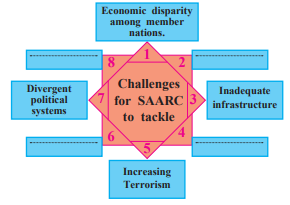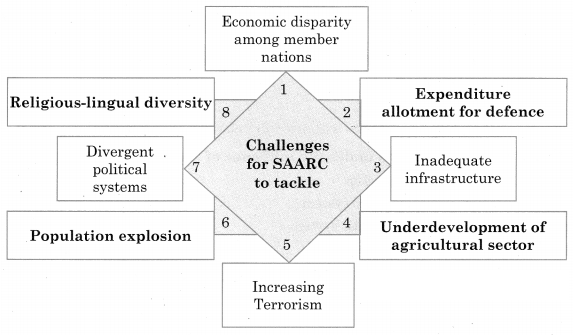Cold War
Exercise
Q.1 Choose the correct alternative and rewrite the statement.
1. The headquarters of SEATO were located at Thailand.
2. A fund named Harare was raised for providing necessary aid to neighbouring nations of South Africa.
Q.2 (A) Write names of historical places/persons/events.
1. On 30th June 1977, this organisation ceased to exist – SEATO.
2. The idea of Commonwealth Games was introduced by – Reverend Astley Cooper.
Q.2 (B) Choose a right reason from those given below and complete the sentence.
1. No country was included in the ANZUS treaty except Australia, New Zealand, and United States of America because they did not want to let United Kingdom and France have an upper hand.
Correct Answer: (a) They did not want to let United Kingdom and France to have an upper hand.
Completed Sentence: No country was included in the ANZUS treaty except Australia, New Zealand, and United States of America because they did not want to let United Kingdom and France have an upper hand.
Q.3 Complete the concept map.
Answer:
Q.4 Write short notes.
Cold War: The Cold War was a period of geopolitical tension between the United States and Soviet Russia, along with their respective allies, from the end of World War II until the early 1990s. It was characterized by ideological conflicts between capitalism and communism, an intense arms race, aggressive political policies, and mutual distrust, but no direct large-scale war. Key events included the division of Europe into Eastern (communist) and Western (capitalist) blocs, the Cuban Missile Crisis, and the construction of the Berlin Wall. The Cold War spread to Asia through events like the Korean Conflict and the Sino-Soviet Treaty. It ended with the dissolution of Soviet Russia in 1991, leaving the USA as the sole superpower.
Non-Alignment Movement (NAM): The Non-Aligned Movement was initiated by nations seeking to remain independent from the superpower blocs led by the USA and Soviet Russia during the Cold War. Pioneered by leaders like Pandit Jawaharlal Nehru (India), Sukarno (Indonesia), Nkrumah (Ghana), Nasser (Egypt), and Tito (Yugoslavia), NAM promoted peaceful coexistence, support for independence movements, and opposition to military alliances with superpowers. The first NAM summit was held in Belgrade in 1961, setting criteria for membership and advocating for global peace, anti-colonialism, and disarmament. Subsequent conferences, like those in Cairo, Lusaka, and New Delhi, emphasized economic development, equality in international relations, and support for causes like Palestinian rights and Namibia’s independence.
Q.5 Explain the following statements with reason.
CENTO became non-operational: CENTO (Central Treaty Organisation), initially known as the Baghdad Pact, became non-operational due to several reasons. Firstly, the member nations—Turkey, Pakistan, Iran, and the United Kingdom—lacked the military capacity to collectively counter a potential Soviet attack, which was a primary objective of the treaty. Secondly, except for the UK, the other members were economically and technologically dependent on the USA, which was preoccupied with other global issues and unable to fully address their needs. This led to dissatisfaction among members. Additionally, internal political changes, such as the 1958 military coup in Iraq that led to its withdrawal, weakened the alliance. By the late 1970s, Iran and Pakistan also withdrew, rendering CENTO ineffective and non-operational.
SAARC has achieved success in some fields: The South Asian Association for Regional Cooperation (SAARC) has achieved success in various areas despite facing numerous challenges. For instance, SAARC established a centre in Bangladesh for disseminating agricultural information, aiding seed research, animal husbandry, and fisheries. A meteorological research centre was set up in Dhaka, and an orthopedic centre was established in Kathmandu. SAARC has also promoted tourism and worked towards poverty alleviation in collaboration with the Economic and Social Commission for Asia and Pacific (ESCAP). Agreements like SAPTA (1993) and SAFTA (2004) have fostered trade among member nations. Additionally, SAARC has addressed issues like narcotic smuggling and development in postal services and transportation, demonstrating its effectiveness in fostering regional cooperation.
Q.6 State your opinion.
The Cold War began between America and Soviet Russia: The Cold War indeed began as a power struggle between the United States and Soviet Russia after World War II. This conflict arose due to ideological differences—capitalism versus communism—and mutual distrust. The division of Europe into Eastern and Western blocs, symbolized by the “Iron Curtain,” intensified tensions. Both superpowers engaged in an arms race, formed opposing military alliances (NATO and Warsaw Pact), and competed globally, as seen in events like the Cuban Missile Crisis and the Korean Conflict. However, their mutual awareness of the catastrophic potential of a nuclear war led to efforts like détente and treaties to limit nuclear weapons, preventing a direct conflict. The Cold War shaped global politics until the Soviet Union’s dissolution in 1991.
India has always opposed colonialism: India’s opposition to colonialism is a cornerstone of its foreign policy, rooted in its own struggle for independence from British rule. Even before independence, India protested imperialism, and post-1947, it actively supported anti-colonial movements worldwide. For example, India hosted a 1949 conference in Delhi to demand Indonesia’s independence from Dutch rule and strongly advocated for the liberation of African nations from European colonial powers. India’s leadership in the Non-Aligned Movement further emphasized its commitment to sovereignty and anti-colonialism. By raising issues of racial discrimination and colonial oppression in the United Nations and supporting movements like satyagraha in Africa, India consistently championed the cause of global decolonization and self-determination.



Leave a Reply